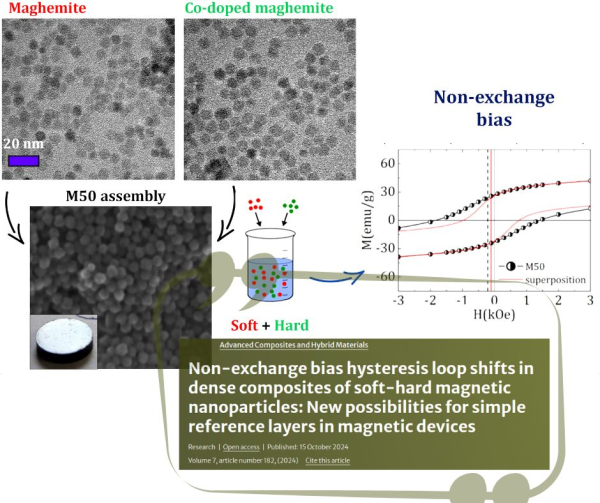This study, the result of a collaboration between the Nm2-Lab at CNR-ISM, UniGenova, and Uppsala University, titled “Non-Exchange Bias Hysteresis Loop Shifts in Dense Composites of Soft-Hard Magnetic Nanoparticles: New Possibilities for Simple Reference Layers in Magnetic Devices” focused on the design and understanding of the properties of hybrid nanoparticle composites, made up of hard and soft magnetic materials. Experimental results and Monte Carlo simulations expanded the understanding of magnetic bias phenomena, revealing new hysteresis loop shifts that do not involve interfacial exchange coupling, hence termed "Non-exchange Bias."
Using binary nanocomposites consisting of soft (γ-Fe₂O₃) and hard (Co-doped γ-Fe₂O₃) materials, two magnetic bias effects emerged that go beyond the classic interfacial exchange coupling. The main findings show:
1. “Asymmetric Reversal-Induced Bias”: adding a minimal amount of soft particles to a set of hard particles with asymmetric magnetization reversal characteristics (i.e., different coercivities on the left and right branches of the magnetic hysteresis loop) produces a tunable shift in the hysteresis loop.
2. “Dipolar-Bias”: dispersing hard particles with exchange-bias effects in a set of soft particles induces a dipolar bias in the soft particles.
These results extend the scope of magnetic bias effects and provide a new framework for understanding and manipulating magnetic behavior in hybrid materials.
The work was carried out with the support of the “Swedish Research Council – Vetenskapsrådet, Swedish Energy Agency.”


 English (UK)
English (UK)  Italiano (Italia)
Italiano (Italia)